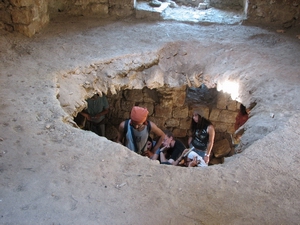I went with Zochrot today on my first tour of a destroyed village. There were about seventy Israeli youth, from a summer camp program, and ten Palestinian representatives of Lifta. The walk down the steep valley into the destroyed village, under the increasingly hot morning sun, set the tone for descending into human suffering. Located just outside of Jerusalem, Lifta had around 3000 citizens who were expelled by Israeli forces in 1948, never to return.
The group gathered at the well, which must have been a beautiful pool at one time, with tile all surrounding it and a natural spring feeding it; now it is a garbage-strewn swimming hole for Israelis. Upon arrival, a Palestinian representative found the sign that Zochrot had placed during a previous visit. It was loosed from its post, defaced, and turned to face the dirt. The man picked it up, cleaned it off and set it on display, overlooking the pool where some Israeli men were getting ready to swim.
We divided our group into three sections and each group was given narratives regarding life in the village, personal attachments and feelings, and emotions associated with a sense of belonging to Lifta. The woman who led our group's narrative does not speak Hebrew strongly, so led it in English. I was grateful because I could engage.
I learned of her grandfather, who was a wealthy landlord in the village. I learned about her father and how his family fled from the village because of the gunshots they had heard and the fear of violence. The expectation was that they would return, having gone through this exercise before: leave for several hours, then return when it was safe. This time, however, there was to be no return. She showed us the very house and room where her father was born. Her children played around us, taking pictures and exploring the source of the spring. I remember looking at her daughters and son, then at the house where her father had been born and felt even just a hint of the connection their family must feel. I was amazed to look at photos of her 92 year-old grandfather, playing with her daughters. She said that she never saw any bitterness in him, even though he lost all his land and all his belongings in the expulsion. I am continually renewed by the power of forgiveness.
From the three-thousand original inhabitants, there are now over thirty-thousand Palestinian descendants who come from Lifta spread out in the world. There is still much left in terms of structures in the town. There is a vast network of paths leading from one partially destroyed and eroded house to the next. After taking a walk through the village, my group sat in the mosque and had a discussion about this young Israeli-generation's responsibility to change the future so that this kind of history stays in the past and is not continued. Many of the youths asserted that they are refuseniks (refuse to serve their mandatory sentence in the Israeli military) and expect to get in trouble from their government for rejecting its demands (most probably jail-time). Our group's host told us that this was the first time her daughters and son had met Israelis who were not in military uniforms. They ranged from teenagers to young adults; I found it very heady to watch and listen to the Israeli and the Palestinian young people talk, interact, ask questions and see each other as human. New friends and not enemies, at all.
When we returned to the pool area, to meet with the rest of the groups, I noticed that Zochrot's sign was no longer against the bush, overlooking the water. The area was filled with dozens of young Israeli children, playing in the water, while their teachers / leaders stood in the shade keeping watch. Eitan Bronstein Zochrot's director) and I looked for the sign and found it, twice folded in half, sending a clear message: whoever did this will not accept that Lifta was a Palestinian village, destroyed in an act of ethnic cleansing. It really bothered me. After all, why deny that this happened? The homes and buildings, including the old school, are vivid testimonies that many souls used to fill the village with the movements of life and the sounds of laughter in the streets. Why deny the memory? Why deny the opportunity for others to be educated at what really happened at Lifta?
This is why Zochrot does what it does: to remember; to pursue memory; to remind Israel of the humanity of Palestine. I was deeply moved by the experience and grateful for it; even if it hurt to see the scars of a tainted ideology scratched into a land and its people.
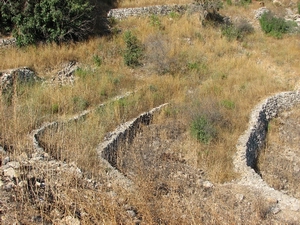
Lifta Darren Birch 2005 (1)
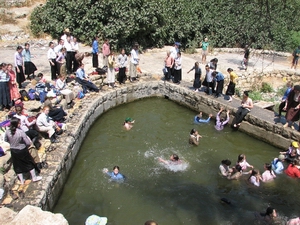
Lifta Darren Birch 2005 (8)
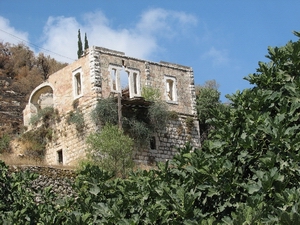
Lifta Darren Birch 2005 (6)
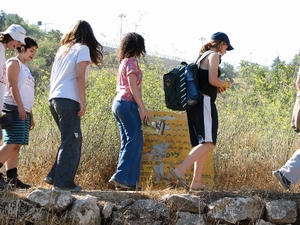
Lifta Darren Birch 2005 (5)
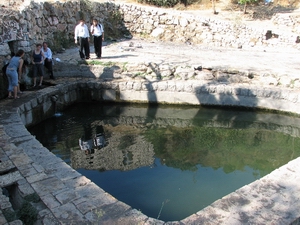
Lifta Darren Birch 2005 (2)
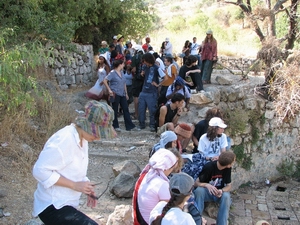
Lifta Darren Birch 2005 (3)
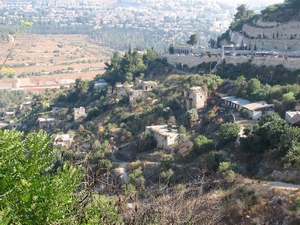
Lifta Darren Birch 2005 (9)
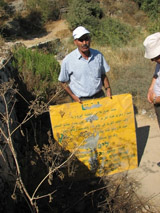
Lifta Darren Birch 2005 (4)
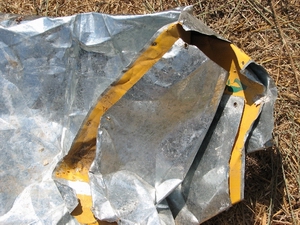
Lifta Darren Birch 2005



